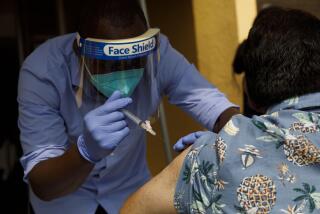Tough Choices for Doctors
- Share via
Dr. Manuel Marquez’s last patient of the day was 74 and had a 30-year-history of heart trouble. Giving Joe Stewart a flu shot was an easy call for the Oxnard family physician.
Tougher was informing Stewart’s wife, Deborah, that under strict new federal guidelines, she didn’t qualify because she is only 54.
“What happens to me if she gets sick?” protested the older Stewart, a frail man who wears a pacemaker. “Who’ll take care of me?”
It’s a scene being replayed in examining rooms across the nation as doctors struggle with an unparalleled shortage of flu vaccine. After years of encouraging annual flu shots, physicians find themselves in the uncomfortable role of vaccine cop.
“It comes down to an ethical issue of trying to do the best thing for the people who need it the most and telling others not to butt in line,” said Dr. Kenneth Gould, an infectious diseases specialist at Kaiser Permanente in West Los Angeles. “That’s a difficult sell in a doctor-patient relationship.”
Dr. John Keats, administrator of a large physician practice, said he is complying with the order even though he questions whether doctors can legally turn down an insured patient who has insisted on a flu shot.
“By contract, if a patient has bought insurance, they are entitled to an injectable,” he said.
Keats and the other doctors at Buenaventura Medical Group in Ventura County have for years strongly encouraged patients to get flu shots. The medical group has become very efficient at it, holding flu clinics after work hours and on Saturdays, Keats said.
Health officials have urged people not to panic over the shortage, caused by problems at a plant that makes the vaccine in England. They point out the flu season doesn’t begin until December or later, giving those in need time to get inoculated.
In the first days following the Oct. 5 shutdown of the British plant that was expected to supply about half the nation’s influenza vaccine, people who were not considered at high risk for flu complications were still able to get shots from their doctors or at clinics sponsored by supermarkets and drugstores.
But distribution tightened considerably after the state’s public health officer on Oct. 8 ordered healthcare providers to control who receives vaccinations.
The order by Dr. Richard Jackson restricts shots to people age 65 and older, infants between 6 and 23 months and persons with chronic medical conditions whose lives could be endangered by the flu.
Still, compliance has been spotty in places. At a Sav-on drug store in downtown Los Angeles, most of those in line for shots the day the state issued the order did not appear to be senior citizens. Many admitted they were not in the “high-risk” group but said they could not afford to get sick this winter. As they waited in line, some expressed worry that the drugstore would turn them away, but in the end, most got their shots.
The scene was different at the flu clinic sponsored by Maxim Healthcare Services inside Longs drug store in Camarillo. Dressed in a gray silk business suit, Maxim official Susan Roehrig was busy patrolling the line, politely but firmly shooing away a middle-aged woman who tried to join the growing throng waiting for a shot.
“I’m sorry, we’re only doing high-risk today,” she informed the woman, who quickly walked away.
An hour into the clinic, Roehrig was so rushed running up and down the line that she traded her work pumps for a pair of flat sandals.
“It’s organized chaos,” she said.
Maxim, which operates the clinics at grocery stores and pharmacies, requires verification that a person falls within a high-risk group before nurses will administer a shot. But Roehrig said the system is not foolproof.
“When it comes down to it, it’s the honor system,” she said. “If someone is going to lie, there is no way we can prove it.”
For doctors, the order is all the more difficult because of the relationship they have with patients.
Some physicians are not happy the state has involuntarily deputized them for enforcement duties.
“If someone is going to come in and demand a flu shot, I’m not going to have an argument with them,” said Dr. Robert Dodge, a Ventura family doctor. “The best I can say is, ‘You are paying me to advise you and my advice is that you step aside.’ ”
Because supplies are low, Maxim will end store-sponsored clinics Saturday, Roehrig said. That is expected to increase pressure on primary care providers to hold the line, Gould and others said.
On Thursday, lines at the remaining flu clinics continued to form.
At an Albertsons in Reseda, nurses initially announced that people age 90 and older and those in wheelchairs would be the first to receive flu shots. But after an uproar from the crowd of about 200 elderly people, some of whom had waited nine hours in the hot sun, they relented.
“I would have come in a wheelchair if I had known that!” one man near the front of the line bellowed. Instead, shots were administered to people in the order in which they stood in line, while a nurse checked Medicare cards and paperwork to make sure they fit the criteria.
Federal officials, responding to the shortage of flu vaccine, have negotiated a deal to ship much of what is left of the medicine directly to doctors, hospitals and nursing homes that serve high-risk patients. But public health officials said that there won’t be enough vaccine to go around for high-risk patients and that they are counting on those who don’t need the drug to go without it this season.
Anticipating the rush, Kaiser has posted signs about the shortage at its medical offices across Southern California and has provided doctors with talking points for discussing the issue with patients, Gould said.
“It is difficult for physicians to communicate this,” he said. “Some patients have panicked and are rushing to get the vaccine.”
State officials have asked private physicians to use just enough vaccine to inoculate their own high-risk patients and redistribute the rest to public health departments, nursing homes and long-term care centers that need it.
Oregon’s health department has gone so far as to notify doctors they will be fined $500 if they violate its rationing directive.
California is relying on the goodwill of the medical community to assess and redistribute supplies, said Norma Arceo, spokeswoman for the state Department of Health Services.
“There is no penalty for violating the public health order -- it’s just an unethical thing to do,” Arceo said.
With conditions changing rapidly, medical providers say they hope to inoculate a wider population before flu season hits in earnest by year’s end.
That was the tack taken by Dr. Marquez as he let Deborah Stewart and her worried husband down gently. Marquez sought to reassure the elderly man. “We’ll get you today and, hopefully, get Deborah back in here a little later, OK?”
Times Staff Writer Amanda Covarrubias contributed to this report.
More to Read
Sign up for Essential California
The most important California stories and recommendations in your inbox every morning.
You may occasionally receive promotional content from the Los Angeles Times.











